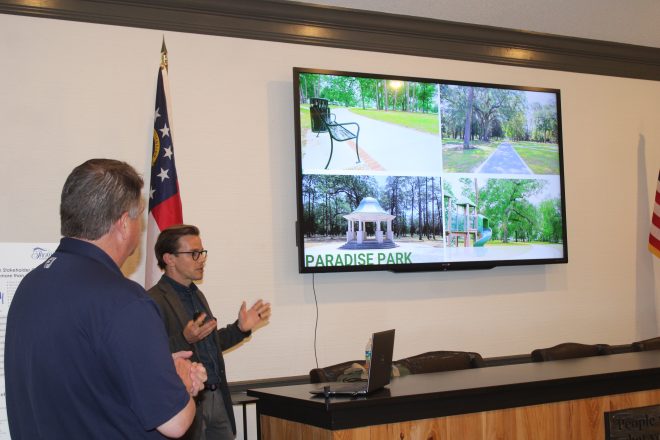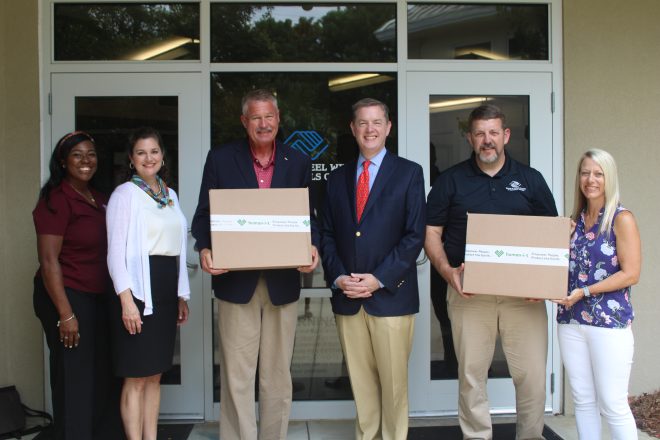Town hall discussion pushes diversity, inclusion
Published 9:36 am Tuesday, January 19, 2021
THOMASVILLE — The conversations and thoughts expressed during a virtual town hall Saturday on diversity and inclusion don’t need to stop with the event’s end, participants agreed.
The annual MLK Jr. Walk and Humanitarian Festival staged the town hall, led by Florida State University’s director of human resources Michelle Douglas.
“Diversity and inclusion is a hot topic in our nation,” she said. “It has impacted all of us in very different ways. These conversations we are having are very timely.”
Said Dr. Mark Adams, a panelist and member of the Hapeville City Council, “We would not be having this discussion if we were not having a new reckoning.”
New Thomasville Police Chief John Letteney had been one of two police chiefs on the North Carolina governor’s task force on race relations and racial equity in criminal justice.
“Diversity, equity and inclusion is important in all we do because we are serving people,” he said. “We are serving people in their humanness and we need to treat people the same.”
Letteney, who has been in law enforcement for 39 years, said diversity and inclusion are critically important.
“It’s important to have as diverse a staff as we can,” he said. “They bring that richness into that organization, that opinion, that voice that we don’t hear. Who we have in leadership roles is important. We need to reflect that diversity of our community.”
Letteney also said building relationship is important, though the COVID-19 pandemic has made that difficult.
It’s also been difficult to recruit minorities to law enforcement in the past year, the chief acknowledged.
“One of the biggest challenges we have in law enforcement is recruiting a diverse workforce,” he said. “We want it, we strive for it but it is very difficult and it’s been much harder in the last year.”
Zach Wheeler, Archbold Medical Center’s senior vice president for human resources, also noted the struggle in hiring minority candidates for health care jobs.
“Our single biggest issue is lack of diversity in the health care population,” he said.
Minorities and people of color are underrepresented in health care, Archbold’s employment of Blacks in health care is triple that of the national average, Wheeler pointed out.
Wheeler said new Archbold president and CEO Darcy Craven has made one of his priorities to work on diversity and inclusion.
“People of color are so underrepresented in health care professions,” Wheeler said. “We’ve got to break that down. We have to bring in more people of color to work in health care.”
The COVID-19 pandemic also has exposed issues in health care disparity, Wheeler said.
“People of color have been disproportional impacted,” he said.
Dr. Adams echoed Wheeler’s statement.
“COVID has been one of the pivotal diseases to show the lack of equity in health care,” he said. “It has truly wreaked havoc in Black and Brown communities. COVID-19 has been a defining moment in disparities in our health care.”
Wheeler said he and fellow town hall panelist Lucinda Brown, the Thomas County branch of the NAACP’s executive director, have worked on scholarship opportunities for minorities interested in health care.
Thomas County Middle School math teacher Cathy Carmichael Jones, the event’s humanitarian of the year, called for more available tutoring for students.
Jones tutors adults trying to obtain their GEDs, many of whom are unable to participate in other GED prep programs because of their schedules.
Many children fell behind when schools closed and much of their lessons went online, she said.
“We’ve got to do something,” she said. “We need to develop some type of free service to our children and parents, because if we do not, in the long run, this community is going to be hurt.”
Dr. Adams also said minorities need to get involved with their local governments and governing bodies. He attended Hapeville City Council meetings for two years before running for office.
“What I saw on the council chambers didn’t look like me,” he said. “Now we have two Black council members in Hapeville. It took 125 years to do that.”
Dr. Adams suggested creating a pipeline to identify and prepare minority candidates for local governing boards.
Brown pointed out that there are currently no minorities on the Thomas County Board of Education and no minority has ever been elected, though some have been appointed.
“People truly need to get involved,” she said. “They need to be involved in their community, involved in government, involved in their school system. The only way people will know what is going on is to be involved in these things.”
Said Douglas, “Having a seat at the table, having a voice, being heard, is important. We have a more informed citizenry as it relates to politics and to how it relates to our roles as citizens in politics.”
Jamie Nunnally, pastor of Victory Fellowship Church, said he notices that Sunday mornings are one of the most segregated times of the week.
“It is a cultural difference,” he said. “Many different races and ethnicities practice their faith in very different ways. Even service lengths vary.”
Nunnally said his church has a congregation that is multi-racial and multi-generational, and it has encouraged him to be more intentional in who picks for leadership roles.
“If they can’t find themselves in leadership, then they probably won’t stick around,” he said. “We want to make sure everyone has a seat at the table and everyone is represented.”
Dr. Adams said the momentum on affecting social change needs to keep going.
“These types of discussion are imperative,” he said. “They continue to need to happen to chip away and dismantle racism and biases within our country.”
Nunnally too called for the discussions to continue.
“We need more discussions, at work, at the kitchen table, we need discussions wherever we are,” he said. “For the white community sometimes it’s scary to talk about race. But our desire to help has to override our desire to hide. It’s time to have the discussion.”
Editor Pat Donahue can be reached at (229) 226-2400 ext. 1806.





